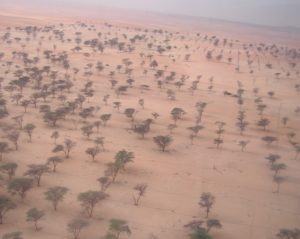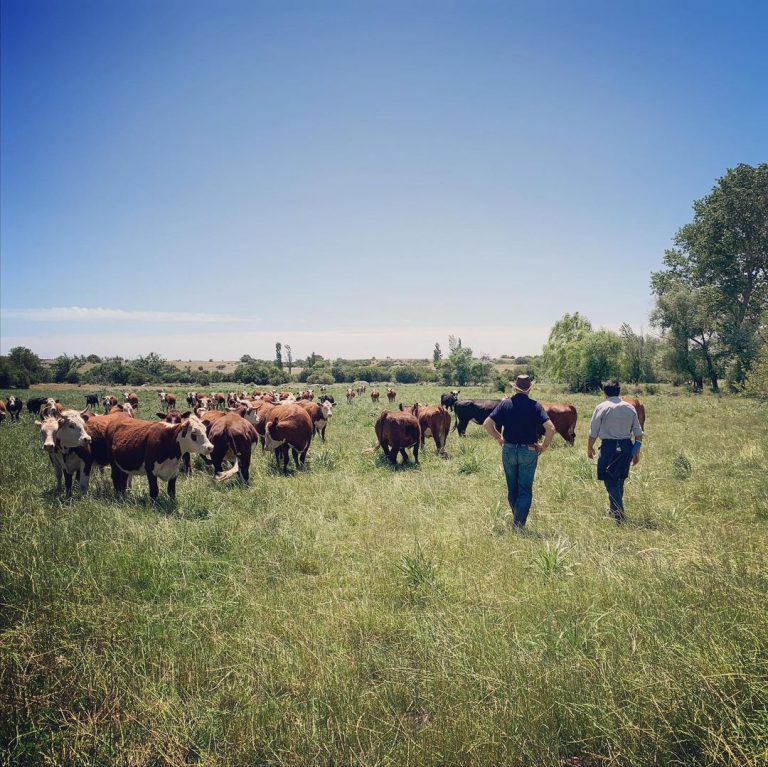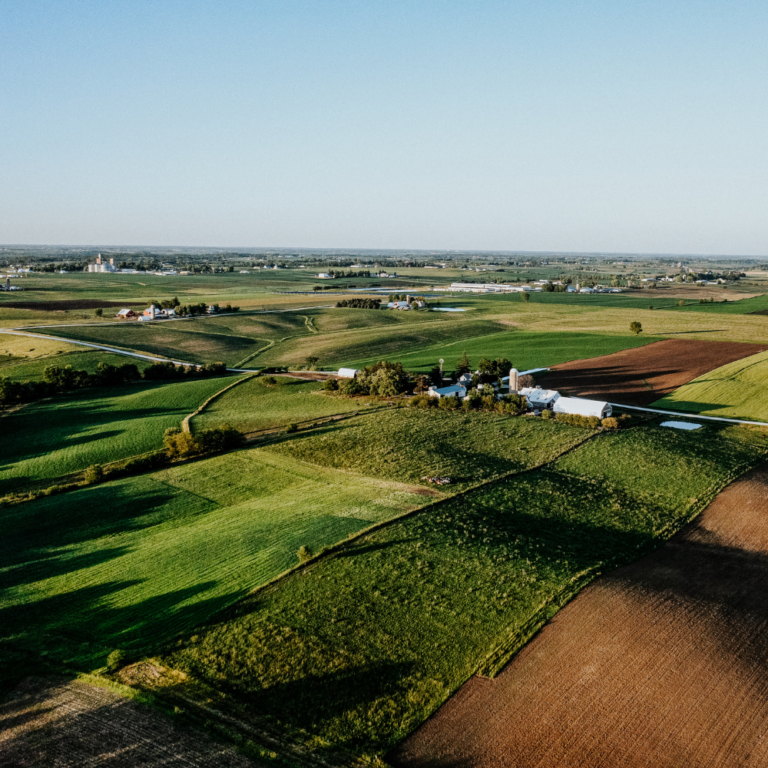If you are concerned about the future of young people today please read this to the end because in today’s short-attention-span sound-bite world, I believe this offers true hope for my grandchildren and yours. In many ways what I write is the culmination of sixty years of struggle to find workable solutions to the devastation I was seeing in my youth.
Confused, without leadership and defenceless, and with children beginning to speak up as they are in America and as did a Swedish 15 year old at COP24, we face grave danger from global environmental degradation with its many symptoms such as ever-increasing droughts, floods, mega-fires, poverty, social breakdown, mass emigration to cities and across borders (Europe and America), violence and war. All of which symptoms are increasing as global desertification and destabilized climate feed on one another in one of Nature’s most alarming feedback loops.
To solve any problem we all know that we need to address the cause of the problem, otherwise all the effort in the world will not succeed.
What is the Cause of global desertification and climate change?
Livestock, coal and oil, according to our institutions, media and society generally, are to blame for desertification and the increasing instability of our climate, commonly referred to as climate change or global warming.
Wrong! In blaming livestock, coal and oil, our best minds missed the simple fact that these are resources and no resource can ever cause such problems.
It is how we manage livestock that causes desertification of the world’s seasonally arid areas with high or low rainfall that constitute about two-thirds of our planet’s land mass.
It is management that calls fossil resources “fossil fuels” and burns them at a damaging rate adding greenhouse gases to our atmosphere.
With 100% certainty it ismanagement causing global desertification and climate change and all the many symptoms. Despite this unarguable fact our best minds including Nobel Laureates continue to blame our resources and ignore the cause.
What is it about our daily management that results in such unintended consequences?
We are in the early stages of the second major paradigm shift in history. Like goldfish in a bowl we cannot see the bowl. The first major shift in world view was from a flat world with the sun going around us, and now we are shifting gradually from centuries of a mechanistic worldview to a holistic worldview. Forty years ago, helped by many people, I discovered almost accidentally that management by humans is, and always has been, what we today call reductionist. And we discovered how, with minor changes to the way we’ve always made management decisions, we could manage holistically in all walks of life.
After over 10,000 years of being unable to prevent global, human-made desertification, we can now reverse it, and address its role in destabilizing climate. And we have repeatedly demonstrated this over the last 50 years to the extent that the work has been recognized in several international awards and holistic management is being taught in the first universities. How has society responded to such new knowledge? Most people would hope with positivity and creativity, just as society did when the Wright brothers learned how to fly after thousands of years of failed efforts. In that case, within seventy years of them learning to fly, we put a man on the moon! The human spirit flew because it is what we are capable of. But with discovering how we could reverse desertification this did not happen.
In the early1980s shortly after I came to America as a political refugee from what was then Rhodesia (now Zimbabwe) far-sighted officials in Washington and Albuquerque, knowing a potential solution to desertification had been developed sought my help. After discussion the U.S. Department of Agriculture commissioned me to provide training over a two year period for 2,000 scientists, managers and academics employed in American land management agencies and agricultural (land grant) universities. Some World Bank and USAID staff also participated. The USDA’s intention was to establish an American training center if the response was positive and demand apparent. Over two years, participants analysed hundreds of U.S. government and World Bank policies in a manner that was not possible until the development of the Holistic Management framework. They found that none of their own policies was likely to succeed and that all of them were likely to have unintended negative consequences. One group in training made a unanimous statement which we recorded and published – “We now recognize that unsound resource management is universal in the United States!”
How we manage resources is, as I earlier explained, 100% the cause of global desertification and climate change. With that in mind, the fact that after a week of training such a large sample of resource managers could make that acknowledgement almost forty years ago was encouraging.
Most people involved responded positively demanding further training. One agency alone (U.S. Forest Service) began talks with me for training some 17,000 foresters. Our Interagency Committee began talks about setting up a formal government training program. Then we struck an unexpected blow. Suddenly all further training of officials was banned by incoming staff in the Reagan Administration. This setback has still not been overcome. It caused what we call a logjam, preventing any constructive policy changes.
That this outcome was inevitable and natural those of us involved, including myself, did not know because we were naïve about how knowledge that is truly new and counter-intuitive spreads in society – no doubt since before Galileo’s time.
Let me explain what I have learned from experience, research and history about why this logjam is natural, why no one is to blame, and how people like yourself, your family and friends, can clear it.
The role of institutions
We do not deal with major issues as individuals, but always do so through organisations, or institutions. We form organizations because they enable us to pool capital and efficiently do what individuals cannot. However, with our mechanistic worldview what we did not know is that organizations do not behave as we expect they will behave. Once formed, organizations take on a life of their own. They do not behave like an individual human would behave, nor in a predictable, mechanistic manner. Even when an organization poisons millions of people, it is not tried for murder, as you or I would be. Nor is any executive severely punished no matter how much damage his or her organization has done to society, our economy, or our environment. When an organization goes bankrupt management is commonly rewarded, with multi-million dollar severance packages, while thousands of people are out of work without compensation. Society, and our institutions, generally do not recognize that organizations are defined in systems science as being complex. Nor do we know what “complex” means in that sense, so let me explain.
Organizations and nature are complex while nothing we make is complex
Everything we do not manage in our material lives is something we “make.”And everything, without exception, that we make – from a toothbrush to space exploration vehicles, or electricity from solar, wind or any other source – stops working if a part breaks, fuel runs out, a battery goes flat. Nothing we make is self-organising. In systems science everything we make is defined as a complicated system.
By definition, nothing we make is complex, no matter how complicated it might be. Problems that occur with things we make are called ‘kind’ problems –relatively easy to fix.
Organizations at all levels – ranging from the family to large institutions and governments – on the other hand are self-organising and do not end when key people die. They simply re-organise. In systems science jargon we define organizations as complex systems.
Everything in nature is also self-organizing and does not stop if species disappear. The biological community self organizes and continues in changed form. Being self-organizing, everything in nature, like organizations, is defined as complex.
Together, nature and organizations, constitute everything humans manage, from our families to governance, with minor exceptions. We manage complexity and it is our weakness at doing so that is the cause of most that ails us.
Rebecca Costa who wrote The Watchman’s Rattle: A Radical New Theory of Collapse, concluded past civilizations failed because they could not address the complexity of rising population and deteriorating environment. They turned away from their equivalent of science to sacrificing people and shelved the problems for future generations.
Where problems with complicated things we make are defined as kind, those that occur with managing organizations or nature can be what are defined as “wicked” meaning almost impossible to fix. It took over 10,000 years to solve the riddle of desertification.
Climate change constitutes a ‘wicked’ problem (as did desertification), meaning it is incapable of solution by the institutions we rely upon to do so, as I will explain. Institutions, having given us knowledge of ‘wicked’ problems, are not, as far as I know, doing anything further to either study or alert the public to the danger of institutional problems. This, despite trillions of dollars being spent over many years addressing symptoms of global desertification and destabilised climate, which are now feeding on each other.
There are at least three known ‘wicked’ problems within organizations:
- While organizations readily accept anything aligned to society’s beliefs, they ignore, ridicule, or violently oppose truly new insights that, given the beliefs of society, are counter-intuitive (paradigm-shifting). A wicked problem in Galilleo’s time and still unsolved. No amount of facts, evidence, data, lives lost or danger to society leads to organizations accepting new insights. This they do not do so until a shift in the public mind takes place. For this to happen can take a century or more as for instance the 200 years it took the British Royal Navy to accept lime juice could end scurvy, despite the importance to Britain and over a million sailors dying. People who discover insights that fly in the face of deep beliefs are generally rejected or persecuted by institutions while alive.
- No matter how intelligent and good the people in any organization are, the outcomes are commonly stupid– lacking common sense. Once you are aware of this problem, it is incredible how widespread it is. For example, ask any person if it makes sense for America to produce oil, to produce corn, to produce fuel. People laugh and say it is stupid – but our institutions do it.
- Organizations seldom admit to error. Commonly they ‘circle the wagons’ and defend the organization, even when it goes entirely against their mission. Think of the Catholic church with wonderful caring intelligent people and how the Church has for centuries protected paedophile priests although against its mission to protect the innocent.
- The first of these wicked problems – inability of institutions to accept paradigm-shifting insights ahead of the public – may never be solved. Having battled for decades against ridicule during which no scientist has shown where the Holistic Management framework logic or science is flawed, I have no answer other than I am urging here, that the public become concerned educated and knowledgeable as rapidly as possible.
The next two wicked problems we may not solve for centuries, but I have a feeling they may be symptoms of the reductionist framework we unknowingly use in management. For the present, let’s look at the first wicked problem endangering humanity and easily demonstrated.
Let’s look at an example of societal beliefs prevailing over science in connection with both desertification and climate change. Society, as far as I can determine, has believed for thousands of years that planting trees is the solution to desertification. Institutions reflect this belief and modern society has expanded it to include planting trees as part of the solution to climate change. There is no Nobel Prize for environment, but society is beginning to realise that environmental degradation and desertification underlie social breakdown and violence. So, it was no surprize that a Nobel Peace Prize was awarded in 2004 to a Kenyan woman for exceptional leadership mobilising her community to plant trees. However, the trees were planted in a small high rainfall region of Kenya that is not desertifying. Almost any botanist, or educated person, knows that trees do not grow close enough to cover soil over hundreds of millions of hectares of Kenya where the rainfall is below 250 mm (10 inch) with prolonged dry periods. And without covering soil there is no chance of ending violence associated with the serious desertification of Kenya.

Common sense, thousands of years of civilizations like the Nabataeans who harvested runoff water to plant trees, and simple botany should all tell us that planting trees, desirable and successful as it is in higher rainfall, can never address desertification. So why then do institutions – government, universities, environmental – act without sense? They do so because there is absolutely no possibility of any solution without livestock that society, and thus institutions blame for desertification. Until the public perception changes we can expect institutions to continue to favour planting trees no matter the cost or evidence of failure. Look at this example of desalination of water and tree planting in the United Arab Emirates. Their government has spent over $30 Billion on about 1% of their land and so obviously failing. The UAE are not alone. China on an even larger scale continues removing livestock and planting trees, even though over a quarter of a million tons of sand blows into Beijing some days, and it is getting worse.
Had those far-sighted American government officials and myself in the early 1980s known about wicked problems we would have understood that the ban on further Holistic Management training was inevitable. I look back with hindsight and think how could I have been so stupid as to think universities, environmental and cattlemen’s organizations were going to accept that livestock properly managed reverse desertification? The universities of seriously desertifying Texas, New Mexico, Arizona and California mainly that brought about the government ban on training of officials could have acted in no other way. And the people within universities who gave me so much help developing the work were as powerless as any to prevent such a ban.
What is most important is that no one is to blame. This behaviour of organizations has been normal and natural behaviour since organizations were first formed I have no doubt.
While wicked problems explain some of the floundering and chaos today, they do not fully explain the global lack of leadership despite the need, so let’s look at that issue.
Why is there no leadership as we face dangers more serious than all wars ever fought?
In the 18thCentury major blundering by organizations was serious, even playing a role in the American revolution. The best minds of the time “solved the problem” – the blunders were clearly due to amateur leadership because men could buy or inherit leading positions in organizations. This was to end with the “Age of Reason or Enlightenment” from which time on organizations would be led by highly trained professional people, as they generally are today. Napoleon championed this ideal solution more than any leaders as it spread throughout Europe.
John Ralston Saul, who wrote the best-selling book Voltaire’s Bastards, studied across many fields to learn how management fared under trained professional leaders. Contrary to expectations that mass stupid blundering would decrease, Saul discovered that it increased under highly trained leadership. Few people today head major organizations without high academic credentials in narrow fields of expertise.
To quote Saul on why experts leading complex organizations managing nature’s complexity are not faring well: “The reality is, that the division of knowledge into feudal fiefdoms of expertise has made general understanding and coordinated action, not simply impossible, but despised and distrusted.”
People increasingly appeal to the leaders of political parties, corporations, large environmental and other organizations to take action on climate change. We do not appeal to individuals to lead us but to those leading organizations.
That history, knowledge of complexity and wicked problems indicate there can be no leadership from politicians, universities, environmental organizations or the United Nations we need to understand more widely. Tragically most people have faith that politicians and our institutions will safeguard future generations. Every parent concerned with the future of their children needs to understand why the world is floundering leaderless with institutional stupidity – there is no one at the helm! And to understand what they can do about it.
If the leaders of institutions cannot lead then who can?
Thankfully history and social research I believe answer this vital question. While we have to manage climate change through institutions, because we cannot as individuals, leadership requires our institutions shifting from reductionist management to managing holistically and thus taking a new direction. However we know institutions cannot do what is needed ahead of a significant shift in society’s view. I have been unable to find a single case in history where any organization has ever changed ahead of the public, when new counter-intuitive knowledge is involved.
Increasingly I read about, or hear people stating that we need to take a holistic approach. However, many people over centuries saw a higher degree of connection to our environment, and thought more holistically, than we do today with most of our population in cities and divorced from our environment. Thinking more holistically did not help those earlier people prevent civilizations from failing when their agricultural practices led to environmental degradation. If we are to not to repeat history, we have actually to change from reductionist management to managing holistically.
Most people are apathetic and so it only needs a relatively low percentage of people to whom it makes sense insisting on change for it to happen. Not a full understanding, but a ground swell of people to whom it makes sense that management, including policies should be holistic in a holistic world. Both history and research suggest that when enough people are actively stating such views institutions can and will change.
Knowing this, when asked where the leaders are I respond by saying it is not the people who discover new insights who lead. It is the first people who help spread the new insights against institutional resistance – free-lance writers, film makers, investigative reporters or widely followed social outlets like TED that make new information available to society. TED by affording me the opportunity to give a 20 minute talk on desertification that went viral did more than thousands of us had achieved over fifty years against institutional opposition. And TED has been criticised by some academics, vegans and environmentalists for even allowing me to speak. In southern Africa I was banned from even setting foot on any university campus for over twenty years to prevent students hearing blasphemy. Slowly as the knowledge gets out it is ordinary people that unknowingly become the leaders as they spread the information and discuss the need till change follows. And that is happening as we see with the first university-led Holistic Management hub in Michigan. A few other institutions are also beginning to collaborate and become involved in the regenerative agriculture movement that is emerging.
Ultimately it is we ordinary people, including those of us working in institutions, that have to become concerned and determined to save our families and offer everyone’s children and grandchildren a future. Recently a 15 year old Swede, Greta Thunberg, spoke up clearly at COP24 almost shaming adults into action with the threat of people power – but what action? And in America the youth are also rising in frustration and fear as we see.

If we ordinary people are to lead what do we need to know to demand change in the right direction?
The clamour for action and change and the mounting frustration and rage associated with it will increase as we continue to flounder leaderless. And it can only increase conflict and violence when everyone is paddling canoes in different directions. Today in conferences, social networking and media there are a plethora of suggestions for what to do: plant trees, remove or reduce livestock, eat less meat, be vegan, manufacture artificial meat, stop fossil fuel use or geo-engineer Earth’s climate. All these actions will fail for the simple reason that none of them address the cause of either desertification or climate change. So we need to apply more wisdom and common sense.
Knowing as we do with 100% certainty that our present reductionist management is the ultimate cause of desertification and our increasingly unstable climate, we need to know what management options are available, and then what each of us can do, personally, today. We need to know what young people, like Greta Thonberg in Sweden or Emma in Denver can demand through youthful people power that is not yet another recipe for chaos.
Libraries, bookshops and Amazon.com are full of management books giving the impression of many management options. However, if we ‘peel the onion’ and keep digging into every management option to the deepest level where the actual management actions are determined, we find that they are all built on the same fundamental foundation. This foundation has been used by all humans since we first picked up and used sticks and stones as tools. Discovered in the 1980s this framework is common to all tool-using animals, and it looks like this:
Intending to improve our lives, we take actions to meet our needs, desires or to address problems we face. So we determine an action –use some tool – make our decision on one or more of many factors (past experience, expert opinion, research results, cost, cash flow, expediency, peer pressure, friends advice, etc.) Without using a tool in this case technology (tap, cup, pipe, dam, etc), we cannot even drink water unless we go to the nearest river and drink with our mouths. So let’s begin looking at all the tools we have in every profession in the world with which to manage our environment.
We have three tools:
- Technology
- Fire
- Resting the environment (conservation)
When society and thus scientists and institutions believe we have a great many tools you might wonder at how I arrive at only three. I did this while training the 2,000 professional people mentioned earlier. I had them write down every tool they had ever used, or been taught to use, in their private or professional lives. That resulted in long lists of things that were all technology in its many forms. Apart from some technology the only other tools were fire or the action of resting the environment.
The only other possibility known, is to use technology to plant trees to address desertification and now climate change, which has been done for 10,000 years without success, and is now being advocated widely as though new thinking.
So, leaving aside the tools at our disposal, let’s see why we call management with this framework reductionist. Everything we manage (organizations and nature remember) involves a web or social, cultural, economic and environmental complexity that is unavoidable. When managing we always reduce this web of complexity to meeting our needs, desires, or solving problems as the reason, or context, for our management actions. It is because management reduces the complexity to a simple context – generally need, desire, problem – for our actions that such management is best described as reductionist.
Another reason, apart from reductionist management, for global desertification is the fact that none of our three tools can prevent or reverse desertification. Two of the tools in our small toolbox – fire, and resting the environment, lead to desertification over most of the world’s land. The other tool – technology – can never address desertification that is a biological problem.
Policy development, an aspect of management, is also reductionist even where the most sophisticated interdisciplinary teams of scientists develop policy. In such cases where every scientist is aware there will be social, environmental and economic consequences and the disciplines in the team cover all of these fiefdoms, the web of complexity is consistently reduced to the problem addressed, as the context for policy actions. The result, as we see for example with policies of the U.S. on drugs, noxious plants, terror, or immigration is that the problems increase and lead to unintended consequences. Remember that sample of 2,000 officials concluded their policies were likely to fail and lead to unintended consequences. So common is this that economists refer humorously to the Law of Unintended Consequences.
What is the Holistic Management framework that offers an alternative to the reductionist framework?
When managing holistically we still take actions to improve our lives as before to achieve needs, desires and address problems. However, we first clarify the WHOLE situation being managed to ensure we know who is deciding management actions or developing policy, and for whom is this being done. Because the web of complexity is not going to be reduced and all actions are going to be in the context of the full social, cultural, economic and environmental complexity, a holistic context has to be determined. The relevant people once identified are those who develop the holistic context, or in some cases develop a generic holistic context that reflects how people in their culture want their lives to be, tied to our life-supporting environment in a state that would ensure such lives for generations to come.
Because this concept does not exist in any branch of science, religion or philosophy, here is a generic example I use when visiting new places, reading research papers, policies, newspapers or simply listening to people talking about their management. I can use a generic holistic context like this, while forming an opinion as to whether the actions or policies would lead to such lives, because it is how almost all humans wish to live:
We want stable families, living peaceful lives, in prosperity and physical security, while free to pursue our own spiritual or religious beliefs. We want adequate, nutritious food and clean water. We want good education and health, in balanced lives, with time for family, friends and community and leisure for cultural and other pursuits. All to be ensured, for many generations to come, on a foundation of ethical and humane behaviour to all life, regenerating soils and biologically diverse communities on Earth’s land and in her rivers, lakes and oceans.
With either a real holistic context or generic holistic context depending on circumstances, we then go about determining actions to meet our needs, desires or solve problems, using all current science, scientific principles, or other sources of knowledge in an entirely non-disciplinary manner with the holistic context as the sole reason for our actions.
Doing this, management becomes easier because most people intuitively know if what they are considering is in line with their holistic context. However, when there is any doubt we use seven filtering questions that help us ensure that the management of our lives, businesses, policies, etc. are in line with the holistic context, while meeting needs, desires or solving problems. Apart from actually making management decisions in this holistic manner, there is one other essential step and that is adding one more tool to our small tool box.
We add the missing tool – livestock – without which, it is not possible to stop human-made desertification over about two thirds of the world’s land, or to address climate instability as mentioned earlier. It is important to understand, that it was my conclusion that only livestock properly managed could save civilization as we know it, and not Holistic Management, that led to half a century of institutional resistance, ridicule and abuse. And it is largely institutional vilification of livestock that underlies the media and celebrity vegan, artificial meat drive. Tragically this public perception of livestock has drowned the very idea of Holistic Management providing a way of managing complexity, something no scientist or institution has opposed.
Where do we go from here?
With nations floundering leaderless, institutions incapable of changing till there is a shift in public perception and demand, each one of us no matter our station in life, no matter whether we work in an institution or not, can start to play a vital role.
Immediately this brings to mind celebrity citizens enjoying large public microphones who could shift public perceptions more easily than other citizens.
Failure of celebrities to lead.
Entertainment, sports, fashion and other celebrities with the purest of motives and whose simplest tweets reach millions of fans owe their status to their fans. So, understandably and somewhat like organizations, celebrities align themselves to the prevailing beliefs of those fans. As I write, literally hundreds of celebrities are jumping on the vilify-meat-bandwagon sensing that this is what fans desire and believe is the right thing to do for our environment, due to animals suffering appalling treatment under industrialized animal production. None distinguish between appallingly cruel factory production and meat produced by caring farmers and ranchers who abhor animal cruelty and confinement and manage their animals in a way that regenerates soils and grasslands. Just this past week Beyoncé and David Attenborough (who I hold in deep esteem) jumped on the vegan bandwagon.
While hundreds of celebrities are investing fame and fortune vilifying meat, a few are also investing in the factory production of artificial meat that can never match the nutritive value of organ and other meat from whole animals, and never sustain millions of people in the largest, most violent region of the world, across North Africa up into China. Over this vast region only animals can feed people on 95% of the land, while addressing the desertification. Humans cannot digest grass and about two thirds of the world’s land is under seasonal rainfall where grass plants play a dominant role in stability and production. Tragically, such well-meaning celebrities are not connecting the dots in our holistic world.
If, as I believe, only ordinary people (including all those within institutions as private citizens) can bring about the needed shift in public perceptions, then let’s briefly see what we should address first, in such a vast sea of issues:
Where do we start faced with so much confusion and “noise”?
The simple answer is we begin with agriculture because we cannot have a church, school, town, university, army, orchestra, government, city or any business without agriculture, so that is the place to start.
Remember that while media and most scientific papers and governments treat agriculture as crop production this is not correct. Agricultureis the production of food and fibre from the world’s land and waters.Our whole planet is today supporting agriculture – fisheries, forestry, cropping, dairy, ranching, pastoralism, wildlife and more. And most vital of all, ultimately no economy (capitalist or other) can sustain any community, or nation other than through agriculture and the photosynthetic process–green plants growing on regenerating soil.
Every scientist, and person with common sense, knows agriculture has to be based on the biological sciences. Humans did so for 10,000 years developing agriculture enabling city-based civilizations. That was until expert leadership led to modern institutional agriculture, on land and waters, based on technology – machines, chemicals, fertilizers, giant ocean bottom dredging nets or now gene modification and transference. The unintended consequences and true cost of such institutional stupidity are staggering.
One statistic says it all. Conservative published figures show over 75 billion tonnes of dead, eroding soil is produced every year mainly from our cropland soils. That is twenty times the weight of the food needed to nourish our current population. Only 6% of our planet is producing crops, on approximately 20% of the land surface. Ocean life is being obliterated, especially in the most productive continental shelves, which are being blanketed by eroded soil and agricultural chemicals. Deserts are expanding, billions of hectares of grasslands burn every year, and millions of hectares of forests burn periodically – all having a profound effect on climate. Modern so-called scientific agriculture is unarguably the most extractive, destructive industry ever in history and a major contributor to desertification and climate instability, as well as rising health problems.
What sort of agriculture should the public, Emma, Greta and millions of youths be demanding?
Organic? Sustainable? Grass fed beef? Permaculture? Biodynamic? Mainstream factory animal production (CAFOs)? Mono-cropping? Agroforestry? Silviculture? Frankly, debating different practices as people are doing in social media ensures a free for all of conflicting opinions. If we promote any practice, be it organic, permaculture or any other that we believe is a good practice you can be sure others will argue for their favoured practice. Even people promoting what they believe are organic, sustainable, permaculture or other good practices end up competing validity of their “solution.”
It is just such public argument that leads to institutional change taking up to 200 years or more as Britain’s Eric Lord Ashby wrote about in Reconciling Man and the Environment. Ashby’s research on how change occurs in democratic societies was based on Britain and America over the last centuries as his case study.We owe it to future generations to seek a faster way to act sensibly.
All agriculture in the past was organic.
Many people favour organic crop production and grass-fed beef believing them to be good for our environment. But that is what every civilization was built on before coal and oil were exploited. All crops were organic and livestock were not force-fed grain. That organic agriculture, we now call sustainable, led to the failure of civilizations in all regions of the world because the environments were degrading. In all of the sustainable agriculture movement under the many names of organizations or practices I can find almost nothing new that was not practiced by past people thousands of years ago.
This is why we need a new, Regenerative Agriculture – a name I first heard in early 1980s from Robert Rodale.
An agriculture that regenerates communities, economies, soil, soil life and our environment. An agriculture that reverses desertification and plays a major role in stabilising climate. An agriculture that enables stable economies to eventually be developed.
Regenerative agriculture needs to become the subject of discussion around every dinner table, social gathering by thinking and caring mothers, fathers, soon-to-be parents or celebrities capable of reading, writing and speaking up. It is long past time for all to speak up, including Nobel Laureates conspicuous by their silence over the destructive nature of today’s industrial agriculture. The first universities to change are beginning to talk about and teach Holistic Management using Holistic Management: A Commonsense Revolution to Restore Our Environment (Island Press 2016) as their text. The tide is turning and now is a time for millions more concerned people to speak up. Remember an institutional wicked problem is the blockage, not the people employed and managing institutions. Our institutions are full of caring, competent people, ignorant about wicked problems, and powerless to bring about institutional change until they and enough people insist on change.
What is regenerative agriculture and what does it look like?
How do you describe it? If we are not clear, this will become yet another cliché, or name used by green-washing institutions continuing with reductionist management for short term profit at everyone’s expense. Already people in the regenerative agriculture movement are promoting practices that while good in themselves will not be regenerative because they are not dealing with the cause of either desertification or climate change.
Agriculture will become regenerative when farmers, ranchers, pastoralists, fishermen, foresters and wildlife managers and institutions developing policies manage holistically. Till that change occurs, politicians and thus governments, United Nations and the big international environmental and humanitarian non-profit organizations (BINGOs) will continue to exacerbate global desertification and climate change even as they respond to public pressure to end the use of fossil fuels.
As soon as a holistic context guides policy deliberations and actions I have found it elevates agriculture above politics and any person pushing a political party or lobbyist point of view appears ridiculous. Once this is done without reducing the web of complexity to needs or desires of special interests the most appropriate agricultural “practices” automatically float to the top for adoption. This literally means the best of agricultural practices including some from mainstream agriculture and, of course, from small farmers, permaculture, organic, biodynamic, pastoral and traditional agriculture sources.
So, if we are to define regenerative agriculture, it would be:
Regenerative agriculture is not any specific practice, but an agriculture that regenerates soils, rivers, oceans, grasslands, forests, wildlife, societies and economies. Its practices are identified within a holistic context, embracing the most up to date science and knowledge, by people acting in their own enlightened self-interest.
The management – holistic, not reductionist – defines regenerative agriculture rather than any specific farming, fisheries, forestry or other practice. And it does so from grassroots level on land and water, to institutional policies. In every region and country, practices would be locally determined and in line with the people’s holistic context. Therefore, agriculture for them would entail practices that are socially sound, environmentally and economically sound in their own enlightened self-interest. I stress enlightened self-interest for two reasons: First, we will never prevent people acting in their own self-interest. Secondly, when people do develop a holistic context, they often come to realise that it is never in their self-interest to damage our environment, or another human.
At first glance this might sound daunting and difficult. It is not. The most common remark I have heard over decades from people in training, or practicing Holistic Management is “This is just common sense.” Nothing would change but the underlying framework using a holistic context and accepting livestock as a fourth tool for use where nothing else can do what is required. And if we don’t allow our personal and institutional egos to block learning as they do, almost any person can learn to manage holistically in a few days, albeit imperfectly.
What can you personally do?
Read about, learn and most of all discuss and share with family, friends, community or co-workers the need for holistically managedregenerative agriculture, and eventually, our institutions will have to change.
All of this now means little for me because at age 83 I am in the departure lounge. I will however continue to urge till my last breath that you focus as much as possible on two things no intelligent person can argue against: that management needs to be holistic and agriculture regenerative.
Can you even imagine arguing in favour of management being reductionist and agriculture unsustainable?
Chances are you live in a city and that makes you more effective.
Most of the economic and political power has shifted to cities and all institutions function from cities, as does the massive public funding through donations to mega environmental organizations. So, join the food and health movements supporting regenerative agriculture. Look for the new EOV (Environmental Outcome Verification) label on food and clothing. This means no matter the practice these items of food and fibre are verified as measurably improving our environment.
Become a champion, giving talks and spreading knowledge of the hope that holistically managed, regenerative agriculture offers. Above all be aware that apathy sustains the status quo and is not an option.
Resist being drawn into media and institutional enthusiasm about the latest UN Sustainable Development Goals (SDGs) which only address the symptoms of desertification and climate change, not the underlying cause, which we now know is due to our management of the resources at our disposal. Until efforts are focused on that, the symptoms (or problems) will only increase, despite the UN institution’s best intentions.
When, as will increasingly happen, young people like Greta or Emma and those they speak for talk about fighting for their future and mobilizing angry youth to bring about desired change, how should you react? Remember they are calling for the management of complexity. Support them blindly and the unintended consequence will be increased conflict and violence and decreasing hope. For them to be supported constructively, as they deserve, I believe it important to make this message go viral – that management needs to be holistic and agriculture regenerative –so that youth of today know that change can happen peacefully and constructively if they insist and demand such change. Something no intelligent person of any age is likely to oppose.
As parents, or soon to be parents, you owe it to your children, grandchildren, families, communities talk to people until our institutions begin seriously addressing what we all want -stable families, living peaceful lives, in prosperity and physical security, while free to pursue our own spiritual or religious beliefs. We want adequate, nutritious food and clean water. We want good education and health, balanced lives with time for family, friends and community and leisure for cultural and other pursuits. All to be ensured, for many generations to come, on a foundation of ethical and humane behaviour to all life, regenerating soils and biologically diverse communities on Earth’s land and in her rivers, lakes and oceans.





